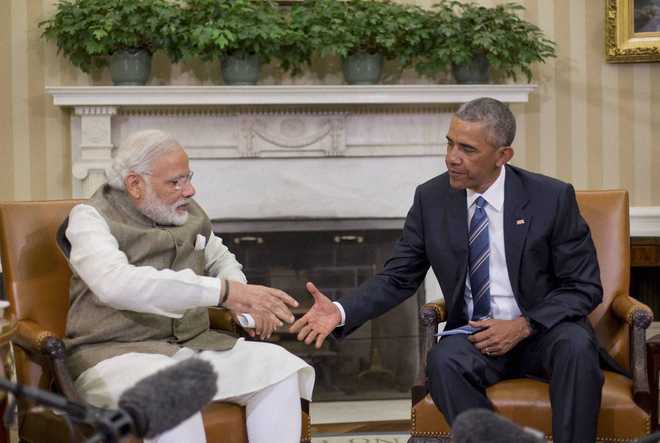
President Barack Obama reaches to shake hands with Indian Prime Minister Narendra Modi during their meeting in the Oval Office of the White House in Washington, Tuesday on June 7, 2016. AP/PTI
Washington, June 10
Describing the just concluded US visit of Prime Minister Narendra Modi as “historic”, the Obama administration has christened his vision of Indo-US ties that has overcome the “hesitations of history” and working for the betterment of the global good as “Modi Doctrine”.“The most important outcome in my mind of the visit this week and of the years of effort that preceded it is the clear and compelling vision that was laid out by Prime Minister Modi before joint session of the US Congress,” Assistant Secretary of State for South and Central Asia Nisha Desai Biswal said.“This vision which I have come to call The Modi Doctrine laid out a foreign policy that overcomes the hesitations of history and embraces the convergence between our two countries and our shared interests,” Biswal told a Washington audience.Biswal, the Obama Administration’s point person for South and Central Asia, said this at a discussion on ‘Security and Strategic Outcomes from the Modi Visit’ organised on Thursday here jointly by the Heritage Foundation–an American think-tank–and India Foundation, a New Delhi-based think-tank.Modi, she said, in his speech furthered his bold vision of India-US partnership that can anchor peace, prosperity and stability from Asia to Africa, from the Indian Ocean to the Pacific and help ensure the security of the sea lanes of commerce and freedom of navigation on the seas.“This Modi Doctrine notes that the absence of an agreed security architecture creates uncertainty in Asia and reiterates India’s adherence to and calls for others’ support for international laws and norms,” Biswal said.India, she said, is now key element of Obama Administration’s rebalance to Asia, a strategy which recognises that America’s security and prosperity increasingly depend on the security and prosperity of the Indo-Pacific.“The joint strategic vision which was issued last year laid out our mutual goals and interests in the Indo-Pacific and across the global commons. We are now implementing a road map that sets out a path of cooperation to achieve those goals and protect those interests,” Biswal said.In his remarks, US Ambassador to India Richard Verma said the US welcomed and shared the Prime Minister’s vision.“We have made a clear and strategic choice to support India’s transition to become, as Foreign Secretary S Jaishankar has articulated, a leading power. Our actions, as security partners in every sense of the word, speak to this endeavor,” he said.“We envision India as a leading power that can uphold international norms and support what Defence Secretary Carter called last week a “principled security network” in Asia. A leading power that can grow its economy while at the same time demonstrating global leadership on clean energy and climate,” he said.“And a leading power that joins likeminded partners to safeguard the global commons. Realising this vision will require diligent work on part of the bureaucracies in both Washington and Delhi and resilience to overcome obstacles that may arise,” Verma said.Indian Ambassador to the US Arun K Singh described the Prime Minister’s visit as “historic”.“There is a need step-by-step to build confidence and to build the habit of working together. That calls for regular meetings, including at the highest levels,” Singh said.On the political side, he said: “We are finding that even though we may not agree on every aspect there is an increasing convergence in our interest and assessment of issues.” In the Prime Minister’s speech to the Congress there was a reflection of the fact that this growing convergence is in the interest of India and the US. The areas of convergence are in the field of terrorism, situation in the Indian Ocean, Asia Pacific region, cyber issues.Singh said the two countries had recognised that clean energy would be an important area of partnership. PTI
